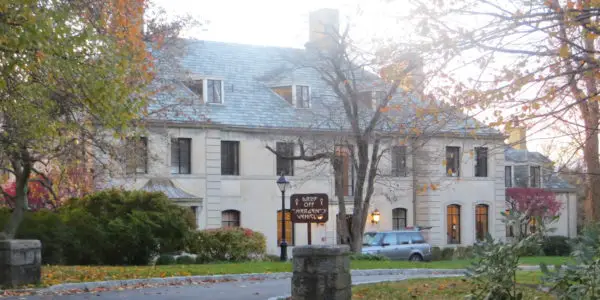
A southern California-based company has turned a nearly 11-acre Irvington property into a residential eating disorder treatment center said to be the only one of its kind in the state.
Monte Nido & Affiliates owns centers in California, Oregon, Massachusetts and Manhattan specializing in treatment for anorexia, bulimia, binge eating and exercise addiction. After receiving its license from the state Office of Mental Health in late October, Monte Nido Irvington this month welcomed its first four patients to a 23-room mansion at 100 S. Broadway.
Carolyn Costin, the company”™s founder who herself recovered from an eating disorder, opened the first center in 1996 in Malibu, Calif. Monte Nido translates as “mountain nest.”
The new Irvington center admits female clients 18 and older in need of urgent and around-the-clock treatment. Patients live in the approximately 10,000-square-foot mansion, which can house up to 14 women at a time.
Other eating disorder treatment centers and hospitals in New York offer partial hospitalization and outpatient programs, said Douglas Bunnell, a Monte Nido owner and the company”™s national clinical development officer, who oversees the New York and Massachusetts programs and all staff training. No other facility in New York offers live-in, full-time care in a domestic setting, he said.
“Really, between Boston and Philly there wasn”™t a residential option for adolescents or young adults, so families were having to travel,” Bunnell said.
Monte Nido opened its newest facility to fill that gap. Many patients at its West Coast facilities were from the East Coast and the company believed the Irvington facility would be a “desired resource,” he said.

After almost a year of looking at houses in northern Westchester and western Connecticut, Monte Nido closed in May on its $6.45 million purchase of the property, long known to Irvington residents as the Murray-Griffin estate. The buyer brought in Centre Partners, a private equity firm, to invest in the facility, Bunnell said.
The Irvington village board of trustees in December unanimously approved Monte Nido”™s use of the 100 S. Broadway property, which last served as a family home after many years without an occupant.
The design of the estate and its proximity to the Metro-North Railroad and Westchester County Airport for staff and clients attracted Monte Nido to the property, Bunnell said. Over the summer the house underwent minimal renovations, which included adding a fire sprinkler system, an additional bathroom and paint to make the color scheme consistent with the company”™s other homes across the country.
Bunnell said Monte Nido”™s owners “fell in love” with the natural serenity of the Irvington property, which he said can help ease patients who often feel anxious and over-stimulated. In addition to the mansion, the property has the historic Odell Tavern, built in 1693, a barn, a garden, a pool and an unobstructed view of the Hudson River from the windows of many of the therapy rooms and patient bedrooms.
“Part of the treatment is helping people to develop ways to settle themselves that don”™t involve eating disorder behaviors,” Bunnell said. “I think somehow being in a more natural setting facilitates that. Being in a noninstitutional setting facilitates that. This doesn”™t feel like a hospital or a business setting, it feels more residential and domestic in some ways.”
The program is also less medical than a hospital, as it focuses on helping clients with the psychological issues that cause their disorder, Bunnell said. Clients participate in individual, family and group therapy. They learn coping skills to manage the emotions, thoughts and behaviors associated with their eating disorders. As they progress in treatment, Bunnell said, they are challenged to face common tasks they struggle with, such as shopping for food, preparing meals and buying clothes.
“As beautiful as it is and as serene as it is, it”™s actually a very hard place to be because people are really confronting and being gently pushed to confront the things that they struggle with,” he said. “It”™s not a vacation; actually a lot of very hard work goes on here.”
Monte Nido employs more than 20 staff members to treat all aspects of eating disorders. They include psychologists, mental health workers, social workers, nurses, nutritionists and a chef who prepares food on site for supervised meals. The center has a staff trainer and a yoga teacher to help women develop healthy exercise routines.

Bunnell said a patient”™s average cost differs according to the insurance benefits they have and the length of time they stay in treatment. “Everyone is different,” he said. Monte Nido has contracts with several insurance companies and will try to reach coverage agreements with other insurers on behalf of individual patients, according to the company”™s website.
“Sometimes there are good faith disagreements,” with insurers, Bunnell said.
There is no fixed length of stay for women receiving treatment at Monte Nido facilities, Bunnell said. They leave when they can adequately manage their own nutrition and their weight has increased, he said. Then they are referred back to their own health care providers.
Bunnell said Monte Nido would like to open the facility to men, an underserved and underrecognized population in the field of eating disorder treatment. He said the historic tavern on the grounds could house male clients. He joked that men might enjoy the billiard room in the basement of the mansion, which has been turned into an art room, although the original flannel carpet and wood paneling remain.
Bunnell said he wants to build relationships with the community. He plans to hire students in health training programs at area universities as interns. The staff also will hold a monthly peer consultation group with other providers and specialists to give presentations, do training and foster collaboration.
Aside from Irvington residents”™ concerns about traffic, parking and preserving the historic tavern, Bunnell said many have been supportive about what Monte Nido will contribute to the village.
“Our response and welcome from the professional community has been just outstanding,” he said. “We had a nice experience coming to this area.”















